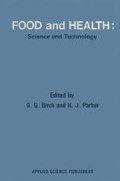Abstract
It is only in comparatively recent years that food science and technology has received acceptance as a discipline and a profession, but already it is recognised educationally by University departments and other centres of higher education throughout the UK. In addition the discipline is supported by an extensive range of journals in which the results of original investigations are reported.
The education of the food technologist must prepare him to serve in the food industry, which in fact is a complex of industries applying different processes to a diverse range of commodities. He is required to approach his work from a position of knowledge and understanding, coupled with experience. The educational curriculum must be designed around such requirements.
Probably more than half the food consumed in the UK is processed or manufactured, and this places a heavy burden on the industry to ensure the health and well-being of the population. The foods produced must not only be attractive and palatable, but those hidden qualities of wholesomeness, nutritive value and composition must be maintained. Food technologists, through their professional institute, the IFST, have recognised their responsibility in these matters in two ways. Firstly they have introduced a Code of Professional Conduct which includes guidelines for the food technologist regarding both his responsibility for wholesomeness of food and his integrity towards the profession.
Secondly the Institute has introduced jointly with the Royal Institute of Chemistry and the Institute of Biology the qualification of Master of Food Control (MFC) which certifies that the holder has a good knowledge of the principles of the technical control of food manufacture and its application to sectors of the food industry.
Access this chapter
Tax calculation will be finalised at checkout
Purchases are for personal use only
Preview
Unable to display preview. Download preview PDF.
References
Bate-Smith, E. C. and Morris, T. N. (eds.) (1952). Food Science. Cambridge University Press.
Institute of Food Science and Technology of UK (1975). Code of Professional Conduct. IFST, Weybridge.
Institute of Food Science and Technology of UK (1975). Professional Conduct Guideline. No. 1. Wholesomeness of Food; No. 2 Relations with the Media; No. 3 Confidentiality of Information. IFST, Weybridge.
Author information
Authors and Affiliations
Editor information
Rights and permissions
Copyright information
© 1980 Applied Science Publishers Ltd
About this chapter
Cite this chapter
Rolfe, E.J. (1980). Education and Responsibility of Modern Food Technologists. In: Birch, G.G., Parker, K.J. (eds) Food and Health: Science and Technology. Springer, Dordrecht. https://doi.org/10.1007/978-94-009-8718-0_5
Download citation
DOI: https://doi.org/10.1007/978-94-009-8718-0_5
Publisher Name: Springer, Dordrecht
Print ISBN: 978-94-009-8720-3
Online ISBN: 978-94-009-8718-0
eBook Packages: Springer Book Archive

